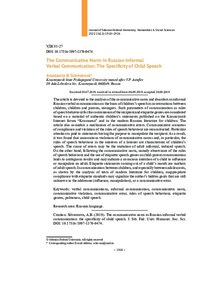The Communicative Norm in Russian Informal Verbal Communication: The Specificity of Child Speech
Скачать файл:
URI (для ссылок/цитирований):
https://elib.sfu-kras.ru/handle/2311/128376Автор:
Silvestrova, Anastasiia B.
Сильвестрова, А.Б.
Дата:
2019-12Журнал:
Журнал Сибирского федерального университета. Гуманитарные науки. Journal of Siberian Federal University. Humanities & Social Sciences;2022 15 (12)Аннотация:
The article is devoted to the analysis of the communicative norm and disorders in informal
Russian verbal communication on the basis of children’s speech in conversations between
children, children and parents, teenagers. Such parameters of communication as rules
of speech behaviour for the convenience of the recipient and etiquette genres are considered
based on a material of authentic children’s statements published on the Krasnoyarsk
Internet forum “Krasmama” and in the modern Russian literature for children. The
article also considers a mechanism of communicative errors. Communicative scenarios
of compliance and violation of the rules of speech behaviour are reconstructed. Particular
attention is paid to statements having the purpose to manipulate the recipient. As a result,
it was found that unconscious violations of communicative norms and, in particular, the
rules of speech behaviour in the interests of a listener are characteristic of children’s
speech. The cause of errors may be the imitation of adult informal, reduced speech.
On the other hand, following the communicative norm, namely observance of the rules
of speech behaviour and the use of etiquette speech genres in child-parent communication
leads to ambiguous results and may indicate a conscious intention of a child to influence
or manipulate an adult. Etiquette statements coming out of a child’s mouth are markers
of adult speech. In communication between children, and especially between adolescents,
as shown by the analysis of texts of modern literature for children, inappropriate
compliance with etiquette standards may signalize the author’s hidden goals that are still
unknown to the addressee (influence, manipulation), or a communicative error Статья посвящена анализу коммуникативной нормы и отклонений от нее в неформальном русскоязычном общении на материале детской речи, в частности исследованию правил речевого поведения в интересах слушающего и реализации этикетных жанров в детском, детско-родительском и подростковом диалоге. На материале
аутентичных детских высказываний, зафиксированных на красноярском форуме
«Krasmama», и текстов современной русской литературы для детей проведен анализ
правил речевого поведения как параметров коммуникативной ситуации. Рассмотрен механизм коммуникативных ошибок, реконструированы коммуникативные
сценарии соблюдения и нарушения правил речевого поведения. Особое внимание
уделено этикетным высказываниям, имеющим цель воздействия на адресата или
манипуляции. В результате обнаружено, что для детской речи характерны неосознанные нарушения коммуникативных норм и, в частности, правил речевого поведения в интересах слушающего. Причиной ошибок может стать подражание взрослой
неформальной, сниженной речи. С другой стороны, следование коммуникативной
норме, а именно соблюдение правил речевого поведения и употребление этикетных
речевых жанров в детско-родительской коммуникации, приводит к неоднозначным
результатам и может свидетельствовать об осознанном намерении ребенка воздействовать на взрослого или манипулировать им. Этикетные высказывания в устах
ребенка являются маркерами взрослой речи. В общении между детьми, а особенно
между подростками, как показывает анализ текстов современной литературы для
детей, неуместное соблюдение этикетных норм может сигнализировать о скрытых
целях автора, еще неизвестных адресату (воздействие, манипуляция), либо о коммуникативной ошибке
Коллекции:
Метаданные:
Показать полную информациюСвязанные материалы
Показаны похожие ресурсы по названию, автору или тематике.
-
Functional Structures of Communicative Consciousness at Infancy: Sociopragmatic Speech and Language Information Processing, at the Oral Statement Producing
Malanchuk, Irina G.; Маланчук, И.Г. (Сибирский федеральный университет. Siberian Federal University., 2013-10)Statement producing process is the traditional problem of psychology, linguistics, psycholinguistics. This problems discussions are carried out as a rule from the view point of processing by a humanpotential speaker of ... -
Network Digital Communication from the General Philological Point of View: the Fifth Texture of Speech
Kim, Igor E.; Ким, И.Е. (Сибирский федеральный университет. Siberian Federal University., 2016-07)The article is an attempt to understand the place of network digital communication (NDC) in the general communicative interaction structure organized by people. To describe the communicative potential of NDC, the concept ... -
On Translating Verbal Etiquette Phrases
Tretyakova, Tatyana P.; Третьякова, Т.П. (Сибирский федеральный университет. Siberian Federal University., 2014-02)The paper deals with the problem of finding general integrative models for translating speech etiquette forms. It is argued that these forms exist as a part of the interactive scenario that is aimed at establishing social ... -
Speech Strategies and Self-Presentation Techniques of Candidates for the Head of the City Administration (as exemplified by the 2010 election campaign in Nizhny Novgorod, Russia)
Ivanova, Rimma A.; Иванова, Р.А. (Сибирский федеральный университет. Siberian Federal University., 2016-09)The article concerns the research of modern Russian regional politicians’ speech portraits. The subject of research is a pragmatic-linguistic unit understood as a minimal, phonetically integral and logically complete speech ... -
The Concepts of Aggressive Information Impact through the Lens of Internet Users’ Worldview Security
Galyashina, Elena I.; Nikishin, Vladimir D.; Галяшина, Е. И.; Никишин, В. Д. (Сибирский федеральный университет. Siberian Federal University, 2021-11)This article is devoted to the forensic analysis of the factors (cyberthreats) determining a negative information impact on recipients’ worldview in the Internet environment (changes in values, emotional perceptions, and ...

